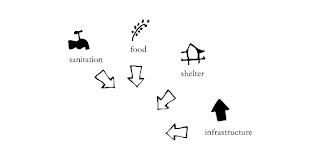The processes that are triggered by extraterritorial industry can be analyzed through a visual projection. We can assume the establishment of economic activity between two political entities as an attractor and a base for further spatial development. The informal formation of a self-settlement around this factory, that depends on the factory and hangs off of its successes and failures is the next step. The growth of the industrial city creates a need for public institutions for exchange, religion, education and health.
The goal of projection is to demonstrate an eventual decline of border security and control mechanisms. A border becomes an economically interesting space because of differences between the two political entities it geographically separates. Increased mobility and exchange will decrease these differences and finally the space will fade out and the border will change location and scale.
In analyzing the architectural build up of such a phenomena it is interesting to determine the choices any person may have when deciding where and how to move when his legal status is a result of geopolitics. In the give case study, but also generically, once someone crosses a border to another state illegally and out of economic or political necessity, he may either choose to let the government legally take 'care' of him or he may choose to try his own luck in the anonymity of the city. The first option may lead to a potential resettlement in a developed nation, or poverty stricken refugee camps with lack of facilities. When the camp inhabitant tries his luck at earning a little money outside this camp he is involved in illegal activities and may be arrested and repatriated. In the latter option, the migrant may in a best case scenario receive a temporary work permit giving him at least a temporarily legal status, which can however be taken away at any given moment, leaving the worker no choice but to work illegally.
If a refugee or migrant or displaced person or asylum seeker could find work extraterritorially and live securely extraterritorially this may provide a very good basis of labor supply for any outsourcing factory. In the case of an under developed and a newly developed country this could also mean a potentially under exploited resource base on one side and a well established infrastructure on the other. The main thing such an industry would need would be an autarkic form of off the grid energy.
The main demand for the outsourcing of manufacturing industry is the availability of cheap labor. The influx of population to work and live extraterritorially at the factory would lead to a rapid build up of shelters, the development of access road networks to the factories as well as the housing. A demand for local food production as well as systems of sanitation.
The new community and its children will find places of exchange in the form of the market, providing livelihoods for those not working in the factory. Other public spaces might include those of religion, such as the temple where people may gather for spiritual well being. The children of the community will need a system of public education in the form of schools. The elderly and sick will need provision of health care in the form of clinics. Potentially non governmental (as the space is independent of government legislation) organizations could play a very large role in providing these mobile services on the river.








No comments:
Post a Comment